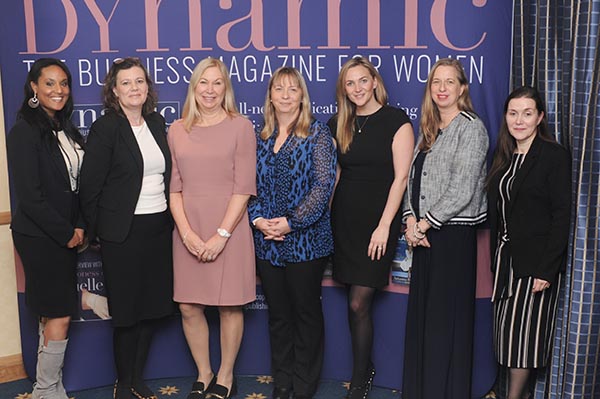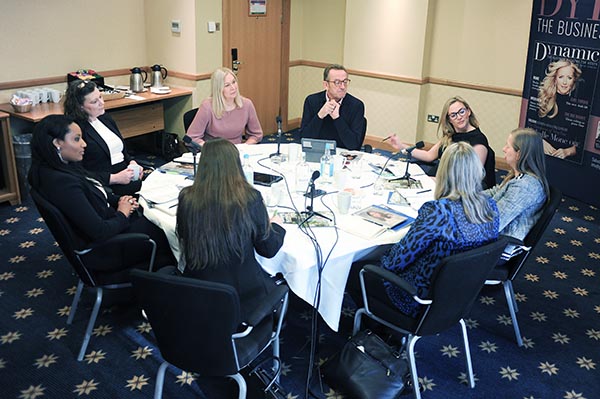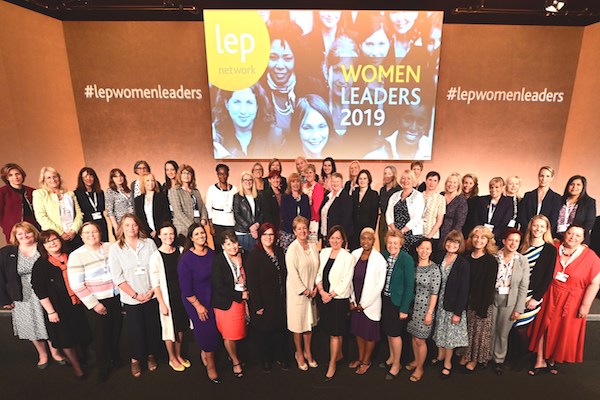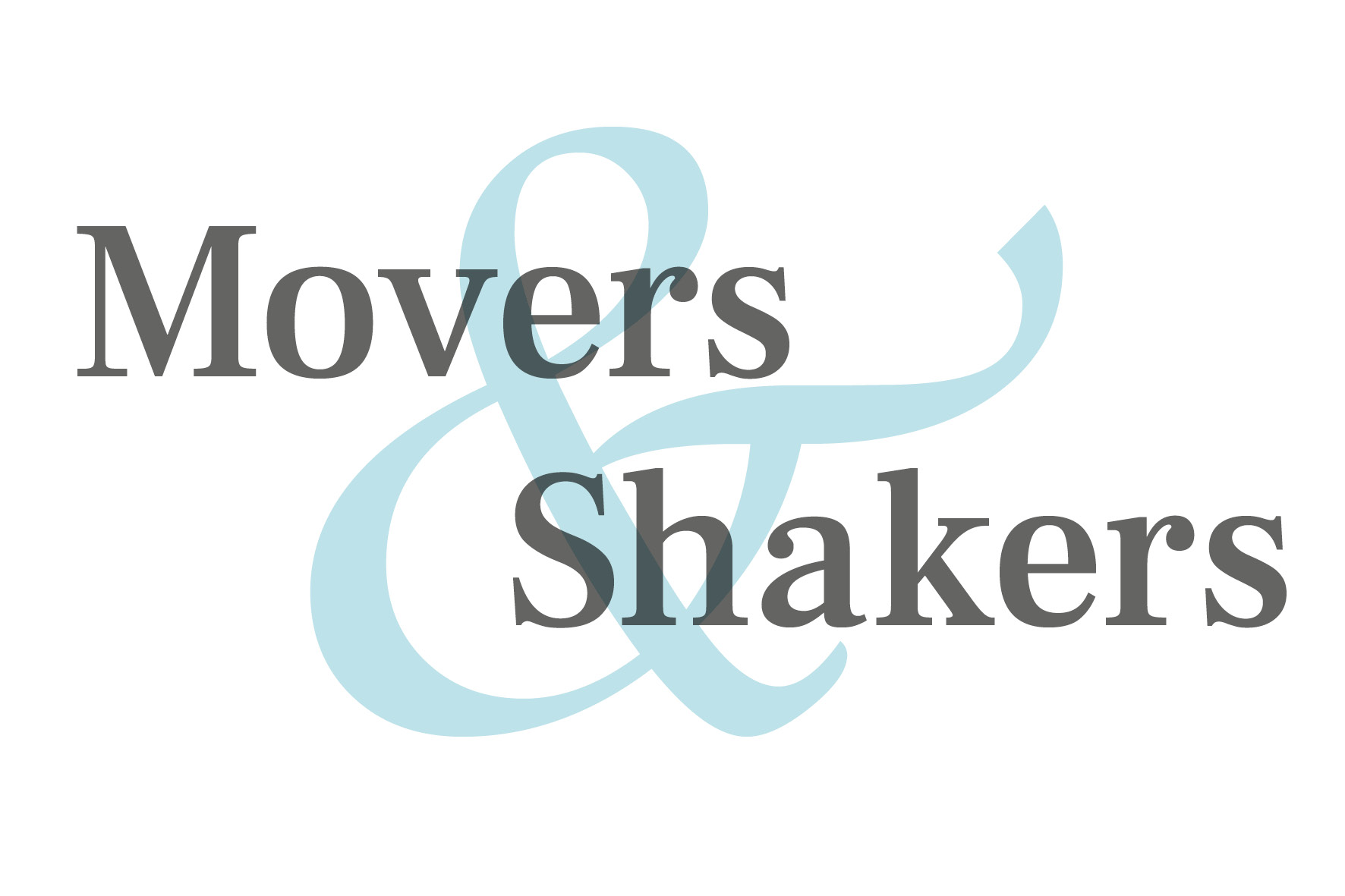
For the first in the 2020 series, we gathered seven of the most influential
female business people to discuss ‘Women In Business’. Platinum CEO Maarten Hoffmann took the role of chair and facilitator, and the panel comprised of the following...

Ana Christie – CEO of the Sussex Chamber of Commerce, which aims to help businesses grow, develop, discover and influence. Ana’s career began in aviation, before later entering senior management in the hotel and tourism industries. Ana joined the Chamber over five years ago and has since re-established it as the largest membership organisation in the county.
Emma Lane - South East Area Director for Allied Irish Bank. Her role is to lead a team of banking and finance professionals. Emma has been in Banking for 20 years, having worked for Barclays and Lloyds. She was one of the first girls to attend the previously all boys school Marlborough College, where her love of all things challenging stems from.
Melanie Richardson - Managing Partner at Swindells Accountants. Melanie qualified as a Chartered Accountant in a top 20 firm over 20 years ago and has worked both in practice and in business. She has extensive experience in running businesses and has been managing partner at Swindells LLP for the last seven years.
Recently promoted to Partner, Rebecca Burford - one of the youngest partners in Charles Russell Speechlys. Ranked as ‘Next Generation Partner’ in the Legal 500 2019, she is able to quickly grasp, understand and effectively communicate complex issues. Impressing clients with her comprehensive legal knowledge and experience, Rebecca was recently placed in The Lawyer’s Hot 100 list of
legal market trailblazers.
Samantha Kaye - Financial Advisor joined Wellesley Wealth Advisory after having spent 20 years working in a pensions, legal and technical environment. During this time she provided detailed assistance to a variety of St. James’s Place practices, helping to formulate plans for their clients. Samantha now wishes to help her own clients by focusing on pensions, investments and inheritance tax planning.
Vicky Steves - worked with the NatWest/RBS group for 12 years and has now specialised in business banking as Business Growth Enabler for the past eight years. Passionate about supporting female entrepreneurs, she was delighted to take the lead in a project to work alongside Coast to Capital, becoming the UK’s first Expert in Residence off the back of the Rose Review.
Lesley Alcock, Commercial Director of The Platinum Group, publishers of the UK’s widest read Business Magazine and producers of the South’s largest Business Awards including, The Sussex Business Awards, The Surrey Business Awards and more. Lesley has had a varied career working at The London Evening Standard, The Observer Newspaper and as part of the creative partnerships team at Capital Radio.
Facilitator Maarten HOFFMANN is the founder of the premier business networking forum in Sussex, The Platinum Club, which takes a totally fresh view on the networking formula and has seen tremendous growth since its inception in 2010. A journalist for many years, Maarten brings strong opinions and an acerbic wit to Platinum Business Magazine.
Does sexism still exist in the workplace?
Vicky Stevens There’s still a long way to go, but I personally haven’t experienced direct sexism. I do know that there are people in the industry that feel it is still there.
Emma Lane The finance sector is still a man’s world. I am quite used to walking into a room of 50-100 people and being the only woman there. At the leadership meetings, I’m quite used to being only one of two or three women. Things are changing but we need to continue to push through the barriers.
Samantha Kaye When I started my corporate career, some 20 years ago, there was a lower expectation for the female university leavers. We were almost expected to walk into the typing pool. If you had any expectations of grandeur in a career it was almost laughed at.
Ana Christie Sexism is more prominent in certain sectors such as finance, law, construction and manufacturing. I experienced sexism in a previous role and heard things being said that you wouldn’t normally expect to hear, but that was over 20 years ago.
Rebecca Burford I work in a male dominated sector and I’m used to being often the only female at a meeting or a networking event. I have definitely witnessed sexist behaviour, sometimes it’s almost subconscious behaviour. However, when I have challenged someone they have accepted it was not right and now think a bit more carefully.
Melanie Richardson I’ve been to meetings and people have assumed I was a secretary and asked me to make a cup of coffee. That wasn’t that long ago. When I first started we weren’t allowed to wear trousers in the office, because we were female. There are still occasional examples of unconscious bias. One of my elderly clients recently asked me why I was the Managing Partner as I was a girl. But that’s the older generation. The younger generations don’t care if you’re male or female, gay or straight.
Lesley Alcock It’s something I did experience at the beginning of my career in Fleet Street. Things have evolved and we’ve come a long way, but there’s still a long way to go.
Emma Not long ago, I organised a dinner with the help of two other very senior women (one a retired CFO, the other a CEO of an engineering company). A chap walked in and looked at the three of us and said, “Are you the secretaries?” We saw the funny side and I have never let him forget it!
What can be done about the cost of childcare? Should large companies be legally required to supply an on-site creche or nursery? Should the government fund nurseries?
Ana My brother and my sister-in-law suffer from this. They both do shift work at the airport. They’ve had no alternative but to have private childcare, which wipes out one of their salaries.
Emma I don’t think it’s a responsibility of government to fix this problem. As a society we do have to come up with our own solutions. One size doesn’t fit all. Some people are happy to go back to work for six months, but others aren’t. We try to help with flexible working, but it isn’t appropriate for every role. I need somebody available from eight till six which is not necessarily appropriate for nursery costs. A child minder can be a bit more flexible because they tend to look after children in their own environment.
The nursery that my children went to was amazing. It was set in three acres with animals and was a loving environment. I was fortunate that I was able to afford it. The same applies to private school fees.
Rebecca We have a head office in London with 700 staff, which could be a great pilot for an in-house nursery. I think it could work.
Emma I’m assuming it would need to be profitable. It shouldn’t just be a perk of working for a firm, because this adds to the cost of doing business. There’s also the danger of this being anti-competitive and disadvantaging smaller businesses.
A small business simply could not offer a creche and could struggle to attract mums returning to work.
Melanie It would be difficult for Swindells to provide anything like that in any way shape or form. We have 40 people working for us. I can’t think how we would be able to provide an on-site service and we certainly couldn’t compete with the larger businesses that would then attract the highly skilled people. I think it would be a backward step for us and similar-sized businesses. We already face a massive skills shortage.
There could be other ways around it. We’ve got childcare vouchers and various schemes in place. Of course, smaller businesses need to be more flexible but I do think on-site nurseries at larger companies could be anti-competitive.
Ana If you look at the makeup of business in the UK, over 85% are SMEs so it would be a huge challenge for the majority of businesses.
Samantha It would just push the problem back to government to expand the childcare scheme, so that there’s greater benefits available for smaller employers in the similar way that the apprenticeship programme was rolled out. It would be a cost, but the overall benefit of attracting women back into the economy could outweigh any expenditure.
Emma It would be a very expensive policy. The cake is only so big and you have to decide where money will be spent. It would be a big challenge to fund free nurseries.
Rebecca The Scandinavian countries seem to be quite successful at providing such services. They also have a much longer period of maternity leave but actually it seems that they get the balance right.
Melanie They have amazing free health care in Scandinavian countries. The general population have a greater expectation of standards of living and aspirations. They have a lot of people who go to university and they have very different social structures to this country.

According to the Rose Review, many women found it so difficult to get back into work that the only option they had was to start their own business. Do you agree?
Vicky There is a skill gap issue. Women might feel they are ready to return, but things move on quickly and they often discover their knowledge and skill base is not up to speed. If you add to this worries about flexibility, then many think that starting a business can work better to fit in with the family. Also there is a lack of access to finance, often because women are more reluctant to take on debt as they worry about keeping the family secure. It tends to be a vicious circle.
The NatWest ‘Back Her Business’ campaign was launched off the back of the Rose Review because we identified this gap. Women want to take their business forward but are typically uncomfortable taking on a large debt.
The ‘Back Her Business’ programme is part grant funding and part crowdfunding. It comes with support and access to mentors. Women are more risk adverse so we want to offer encouragement.
Samantha There’s a huge appetite for women to go back into business. The Mums in Business Network on Facebook has over 100,000 members - it is effectively a networking group where women offer their services to each other and help each other progress. When a woman has put her heart and soul into generating her own individual business, she takes comfort from talking to another fellow mum or another fellow woman who has been through similar experiences.
There are so many women who are desperate to be entrepreneurs and work around their children’s pickups. But what I see my day to day job is they don’t know to grow the business when it starts to take off. It’s about taking a little leap of faith into making a go of it, rather worrying about the risk of failing.
Women starting businesses often need help with their financial affairs as often they have never had to to do it.
Emma Our customers tend to be more established businesses, and there isn’t an issue about the gender of the management team or the CEO. But we are understanding of our clients’ needs. For instant we recognise that arranging a meeting at 9am is not convenient for some people but 10.30 is fine.
How important is it to have a mentor or role model?
Vicky I am so passionate about role models. It is so important for young females in schools to have somebody to look up to. It is especially important in very male dominated industries like construction and technology. Talking to a female who’s done significantly well is really powerful. It’s just really important to have somebody you can relate to.
Melanie I have usually had male mentors. One would make me go away and read the broadsheet newspapers and then quiz me every lunchtime to make sure that I got a broad range of views and knowledge that I could talk to clients about. In every key job I’ve had, there’s been somebody who’s mentored me – it’s been a massive influence on my career.
Vicky It doesn’t need to be someone of the same gender or race, just somebody that you can relate to. But if you are in a male dominated industry, you might find that you relate more to a successful female.
Rebecca I have had several mentors over my career, all men who wanted to see me succeed and got nothing out of that relationship, other than the satisfaction of helping.
Melanie To help someone grow and develop must be one of the most satisfying things you can do.
Rebecca Absolutely. My great aunts, who are now aged between 75 and 90, were all fantastic role models and I didn’t even realise that until recently. One of them was a civil engineer. To be a black, female civil engineer in that generation must have been amazing. Another great aunt was head of training for IBM in America. These women were pioneering. They became role models without even realising. I think they were just determined.
Emma In North America, you often see women working on the roads, under lifts or fixing the escalators. I noticed it as for me it seemed unusual, but it was just normal there. We think we’re a fairly equal country but you just don’t see it. When do you ever see women mending pot holes?
Should every company with more than 500 employees, by law, have a female board member?
Emma We benefit from having women on the board. Women tend to approach things slightly differently. We tend to be more collaborative, more collegial, and we want to have a discussion. It makes the board much more rounded and more appropriate to society.
Vicky Coast to Capital encourages more females to come forward and be part of the board. Julie Kapsalis does a fantastic job encouraging diversity - it just gives that different perspective
Melanie Making it a legal requirement brings in that ‘shortlist’ thinking. It has to be a case of actively seeking to find people who will fit on the board who just happened to be female, as opposed to looking for a female and putting them on the board just for the sake of it.
Lesley It’s the recognition of talent. It’s about looking at the people you’ve got and rather than overlooking the women, they should be considered equally for those board positions. That’s something that perhaps hasn’t happened historically.
Are successful men regarded as confident, while female colleagues are called bossy?
Emma Successful men and women are certainly treated differently. I wonder how many senior women have been accused of being bossy in their career?
Melanie Bossy is such a negative word. No one would ever use that to describe a man. He would be assertive.
Rebecca Or we get labelled as aggressive. I’ve been compared to a dog with a bone, because I will champion something.
Samantha As part of a Chartered Insurance Institute programme, we go into schools to talk to young people about money, including the risks of using credit cards and payday loans. We find many girls are very confident and loud, more so than the boys. I don’t know what happens between them leaving school and starting work.
Ana We see many women starting businesses when they return to work, but what is worrying is the lack of young business women coming through. I am on a judging panel for a Dragon’s Den style event for 16-21 year-olds, and it’s usually only 10-20% female. Schools and colleges need to do more to encourage more females to start their own businesses.
Vicky Education is so important. The bank is looking to roll out a programme where we go into schools and speak to those children or younger adults about having an entrepreneurial mindset.
Melanie It’s interesting to see if there’s a definite change in people under 30. There seems to be a real positive change. When I’m recruiting, the young people that we are training all view each other as equals. It’s such a nice thing to see and I really hope it carries on.
Rebecca My niece is going to be a leader. She has this incredible personality and she’s so young. We are very careful about the language we use around her, being very careful not to call her bossy. She’s determined and she’s strong. We have to educate girls that it’s alright to ask and be confident.
You can hear more of the discussion by streaming the exclusive podcast at www.buzzsprout.com/887299. You can also download it via the usual podcast apps. Search for ‘The Influencers Forum’.
If you'd like to comment on what you've read or heard, or want to get involved in future discussions, please email info@platinumpublishing.co.uk






